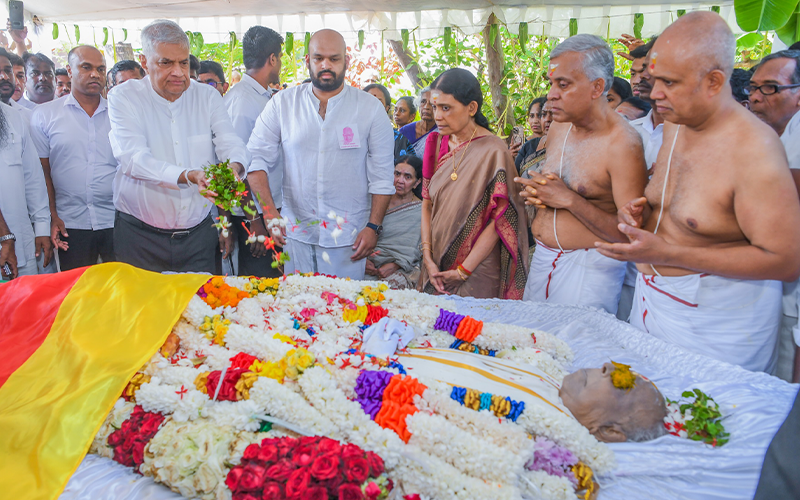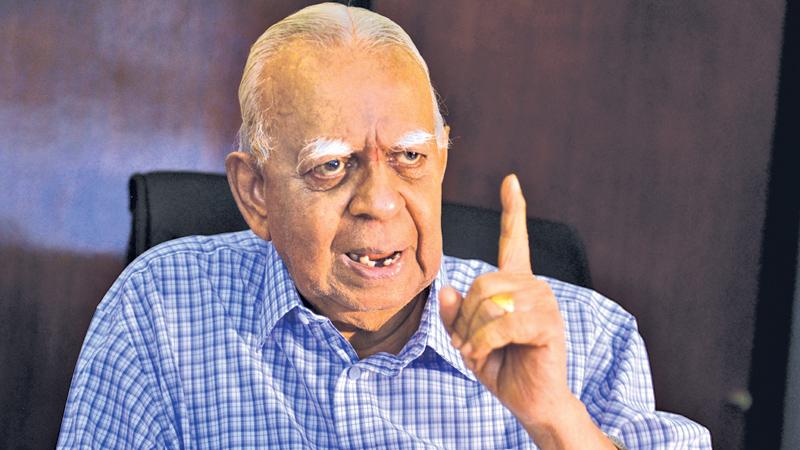
Attending the funeral of the late Tamil National Alliance leader, R. Sampanthan, Sri Lanka’s President Ranil Wickremesinghe commemorated his passing stressing that Sampanthan had “always said that this country cannot be divided” and instead advocated for either a federal system or greater devolution.
Sampanthan’s record on the 13th Amendment

During his speech, Wickremesinghe further claimed that he was progression negotiations with chief ministers to further the implementation of the 13th amendment but stressed that this would permit for the transfer of policing powers.
Last July, Sampanthan had written to India’s Prime Minister, Narendra Modi, slamming the Sri Lankan government for attempting to “abort the implementation of the Thirteenth Amendment to the Constitution resisting brazenly the continuous demands for the devolution of land and police powers and by misappropriating powers already enjoyed by the provinces by legislative manipulations”.
In his letter, he further details the history of previous proposals considered by the Sri Lankan government which include:
“The government proposals for constitutional reforms in 1995 and 1997 under President Chandrika Bandaranaike Kumaratunga, and the Constitutional Bill of 2000, all proposed extensive devolution of power, and abandoned the unitary state structure”.
Sampanthan was first elected to Sri Lankan parliament in 1977 as one of 17 MPs of the Tamil United Liberation Front (TULF), on a platform of a seperate state for Tamils in the North-East. Sampanthan would later represent TULF at the first set of peace negotiations with the Sri Lankan government in 1985 and would support a joint declaration made by the various Tamil delegates, commonly referred to as the Thimpu principles. This declaration built on the earlier 1976 Vaddukoddai resolution and espoused the following cardinal principles that recognised the right of Tamils to self-determination.
Read more here: Remembering the Thimpu principles
These principles were rejected by the Sri Lankan delegation for allegedly violating Sri Lanka’s constitutions. Later the Sri Lankan government would enter discussions with the Indian government to establish a settlement without the involved of Tamil political leaders, this would result in the Indo-Lanka Accords of 1987. The Indo-Lanka Accords introduced the 13th amendment and called for devolution to North-East provinces of a number of powers including over land and policing.
In writing to Prime Minister Modi, Sampanthan noted his objections at the time to the 13th amendment being introduced under a unitary framework writing:
“The Amendment was introduced into a Unitary Constitution making the exercise one of decentralization instead of devolution, to which I along with my leaders, Messrs. Amirthalingam and Sivasithamparam responded by writing to the Prime Minister at that time, Shri. Rajiv Gandhi. We pointed out several flaws in the proposed amendment and consequently the Government of India obtained an assurance from President J R Jayawardena that those will be rectified. It is against this background that every effort made thereafter moved in the direction of surpassing the Thirteenth Amendment towards a federal structure”.
‘Eelam will bloom on account of your lotus bud’
Whilst Sampanthan has voiced support for support for a federal solution, he has garnered criticism for claiming to Sinhala media that he accepted Sri Lanka's lion flag and national anthem whilst simultaneously telling Tamil media that that the LTTE were "freedom fighters".
In the lead up to the 2019 election, Sampanthan spoke in parliament slamming former Mahinda Rajapaksa for alleging that the election would result in Tamil Eelam blooming.
“We only talked of a solution that is acceptable to our people, that is reasonable, substantial power sharing within the framework of a united, undivided, indivisible, single country. That was the propaganda we carried out in all our areas. And when we did that, how dare President Rajapaksa say that Eelam could bloom after the election? This is not only the deception of the people in the South, innocent, single people in the South, but it is the deception of everyone, including himself. I would like to say, Sir, that I would like to put this on record, because I want everybody in this country to know that it was malicious, vicious, fallacious, false propaganda on the part of President Mahindra Rajapaksa and the Podujana party. And if you persist in this agenda, I want to tell you, Eelam will bloom, not on account of us, on account of your lotus bud”.
Tamils have consistently raised their voices against accepting the 13th amendment, and Sri Lanka’s unitary framework, as a permanent solution and have instead insisted upon the recognition of Tamil nationhood, self-determination and sovereignty.
